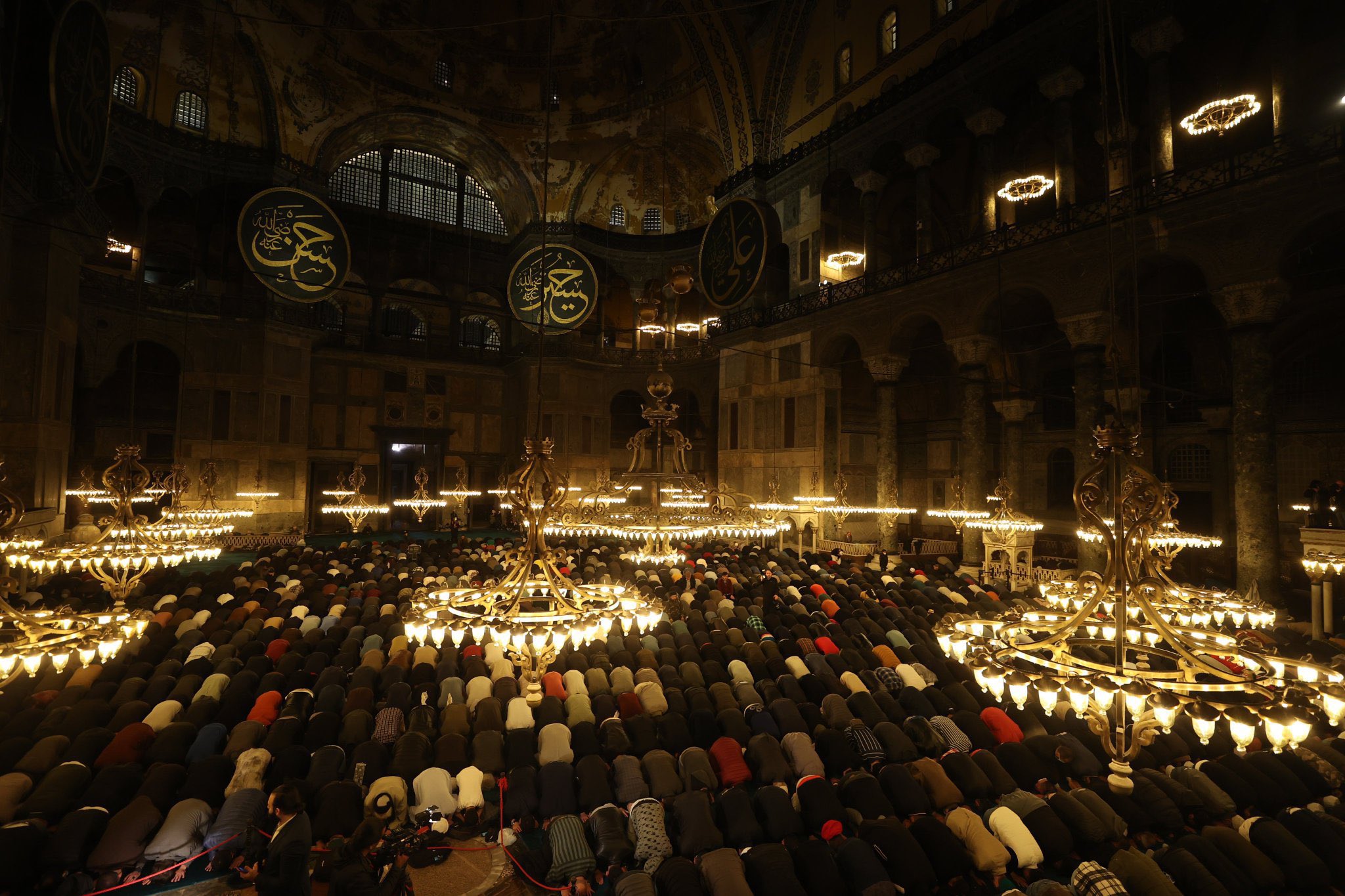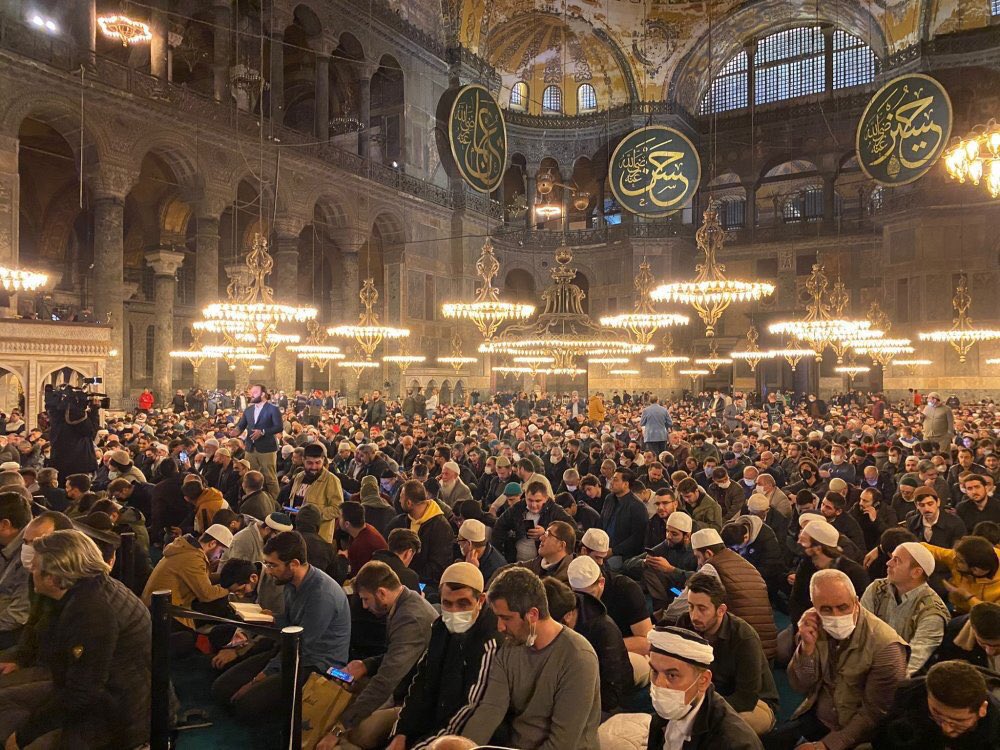Sun 03 April 2022:
In the vicinity of deserts, where food and water sources were scarce, the first Muslims in Medina learned to fast all day long under Prophet Muhammad’s guidance.
Many Muslims around the world are preparing themselves for another Ramadan, a fasting month in Islam, which will mark the 1,398th anniversary of the first holy month this year.
Dating back to 624 BCE, the first ever Ramadan was observed in the city of Medina in today’s Saudi Arabia, according to the Gregorian calendar.
The date also marked the second year of the Hijrat, or migration in English, which played a crucial role in Islamic history. Under paganist pressure, this small community of Muslims were forced to leave the city of Mecca and move to Medina for refuge in 622.
Following Prophet Muhammad’s instructions to go for Hijrat, his companions, the first Muslims, chose to start their own calendar with the starting date of Hijrat, a profound transformative event, marking its beginning.
Salaat Taraweeh was held in the Hagia Sophia Mosque for the first time in 88 years.
The first Ramadan for Muslims happened to be in March, a spring month, in which temperatures in the Arabian Peninsula including Medina were milder compared to summertime, when intense hot weather hits both desert and urban areas.
“O believers! Fasting is prescribed for you — as it was for those before you — so perhaps you will become mindful [of Allah],” said the Quran, instructing Muslims to fast as other believers of God who preceded them did in previous times.
The verses were revealed to Prophet Muhammad in February 624 BCE, or in the month of Shawwal in the second year of Hijrat, according to Kasif Hamdi Okur, a professor of Islamic divinity at the Hitit University.
While Prophet Muhammad and some Muslims fasted some days in particular months in Mecca prior to the Quran’s Ramadan verses, fasting 30 or sometimes 29 days straight without any interruption was an extraordinary experience for the first Muslims, Okur tells TRT World.
Salaat Taraweeh was held in the Hagia Sophia Mosque for the first time in 88 years.
“There are records from Prophet Muhammad’s time, which indicate that even the first Muslims had some difficult times to get used to Ramadan fasting in the first year,” he says, signalling that it is one of the Quranic measures to create a unique spiritually disciplined Muslim society (umma), which can brace both psychological and physical difficulties.
A short time prior to the revelation of Ramadan verses, Muslims also changed their prayer direction (Kiblah) from Jerusalem (Quds in the Quran) to Mecca’s Kaaba, the cubic structure built by Prophet Abraham to pray to the one God, according to Muslim understanding. All these changes happened after the Prophet’s followers established a strong base in Medina.
By changing prayer direction and fasting in an uninterrupted way for a month, the first Muslims deeply felt that they were a different religious community from other monotheistic groups, Christians and Jews, members of whom were living alongside them in Medina, developing a strong self-consciousness about their own identity, according to Okur.
Also the first Ramadan remarkably coincided with the first crucial military engagement, the Battle of Badr, between Medina-based Muslims and Mecca-led paganists, he adds. While the total participants of the battle for both sides did not exceed 1,200 fighters, its end result favouring Muslims ensured the new monotheistic religion’s historical survival, allowing it to flourish across the world over centuries.
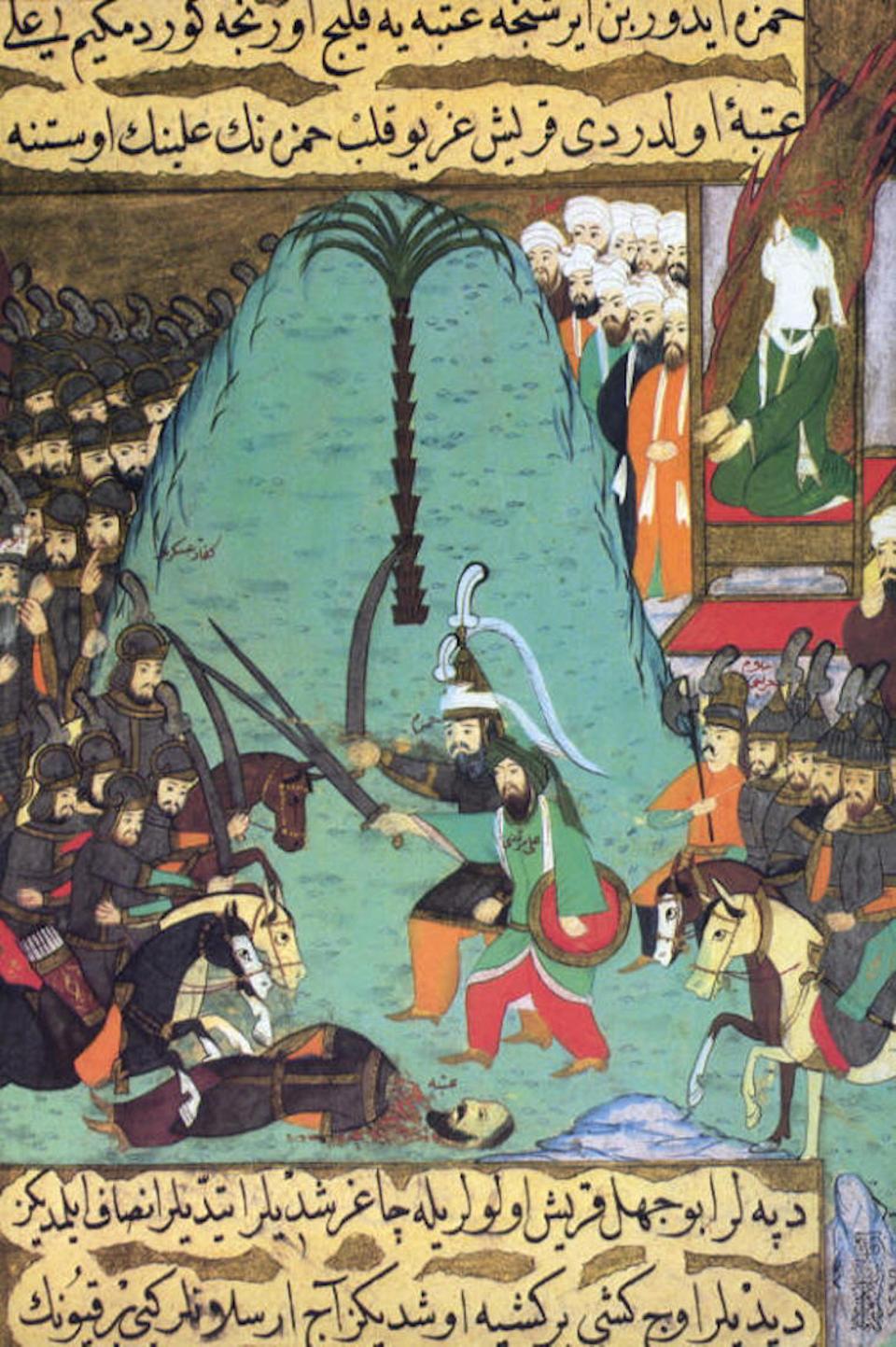
Prophet Muhammed’s leading companions, Hamza and Ali, lead the Muslim army at Badr, according to an Ottoman Naskh. (Wikipedia Commons)
But fasting is not imposed on everyone without exceptions. The Quran, which has always promised to maintain a middle path for believers to make their life straightforward and fair, brought exceptions to people like the very old, sick, pregnant women and children to exempt themselves from fasting, the professor says.
If a Muslim adult has legitimate reasons not to fast, he or she should feed a poor person for one day for each day he or she could not fast, according to Quran.
Ramadan: a moral marathon
Despite the difficulties of fasting, which tests a Muslim’s physical endurance as well as his/her psychological strength, like the feeling of the huge relief of finishing a marathon running, Ramadan brings a lot of blessings and forgiveness from God, Prophet Muhammad pledged.
“‘Woe unto the servants who have reached this month of Ramadan and cannot be forgiven,’ says Prophet Muhammad,” Okur says.
In Islamic thinking, fasting is not just banning yourself from food and drinks but attempting to purify yourself from your wrongdoings, says Ali Celik, the dean of the divinity faculty of Dumlupinar University, who has extensively written about Ramadan and fasting.
“In the practice of the Prophet, fasting is not just a form of worship consisting of starvation. The Messenger of Allah (SAW: May Allah honour him and grant him peace) sees fasting as a shield that protects Muslims from evil. Being more patient in relations with people, avoiding bad words are among the basic characteristics of the fasting person,” Celik tells TRT World.
“Allah does not need a man who does not abandon bad words and actions, to abandon eating and drinking,” says a hadith recorded by Muhammed al Bukhari, a Muslim scholar, emphasising the spiritual side of Ramadan fasting. Hadiths are sayings of Prophet Muhammad.
As a result, the Prophet and his companions would increase other worships in Ramadan.
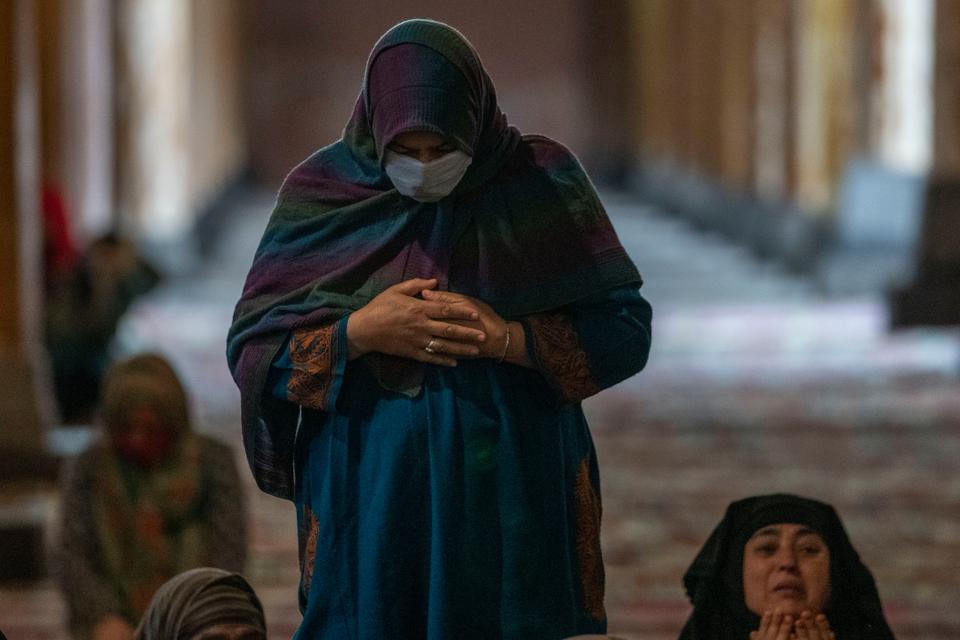
Muslims increase their worshipping activities in Ramadan. In the picture, Kashmiri women pray inside Jamia Masjid, or the grand mosque, in Srinagar, Indian-administered Kashmir. (Dar Yasin / AP Archive)
“Particularly, in the last 10 days of Ramadan, he would prefer to engage in worship by entering Itikaf in the mosque,” Celik says. Itikaf means to separate yourself from others, devoting your time to worship rather than worldly affairs to get a better understanding of your life’s direction.
Every human activity was also arranged according to Ramadan’s rituals because the first Muslims saw Ramadan as a period that was “centric” to their spiritual life, says Okur. “When people in Türkiye express their love for old Ramadans, it usually refers to pre-modern times, where working hours were also arranged according to the fasting month’s rituals.”
But worshipping and fasting do not mean giving up all work and other practices of daily life, Celik observes. “The Messenger of Allah (SAW) would try not to interrupt his daily life in Ramadan, and if he had to do something while fasting, he would do it. He would not delay any work that had to be done on the pretext of fasting,” says Celik.
Interestingly, even during the march for the Battle of Badr, which coincided with Ramadan, the Prophet, who was also the military commander of the Muslims, fasted, says the professor. In Islam, fighting for a just cause is also considered a religious duty like fasting during Ramadan.
The Muslim March towards Mecca, which ended up conquering the native city of the Prophet from the paganist rule, also happened during Ramadan, Celik underlines, showing the Prophet’s hard-working attitude even during the fasting month.
What was their food?
There is some serious distance between today’s Muslims and the first Muslims in terms of not only morality but also their fast-breaking attitudes.
“There are serious differences between us and the Prophet’s companions in terms of Ramadan food. The first Muslims had no opportunity to have food like we do now in terms of its diversity and quantity,” says Okur.
Muslims call their fast-breaking iftar and their pre-dawn meal suhur. “During their suhur, they were probably eating a couple of dates alongside some water. That was it,” the professor says, describing a kind of suhur which is right now almost unthinkable for many Muslim households.
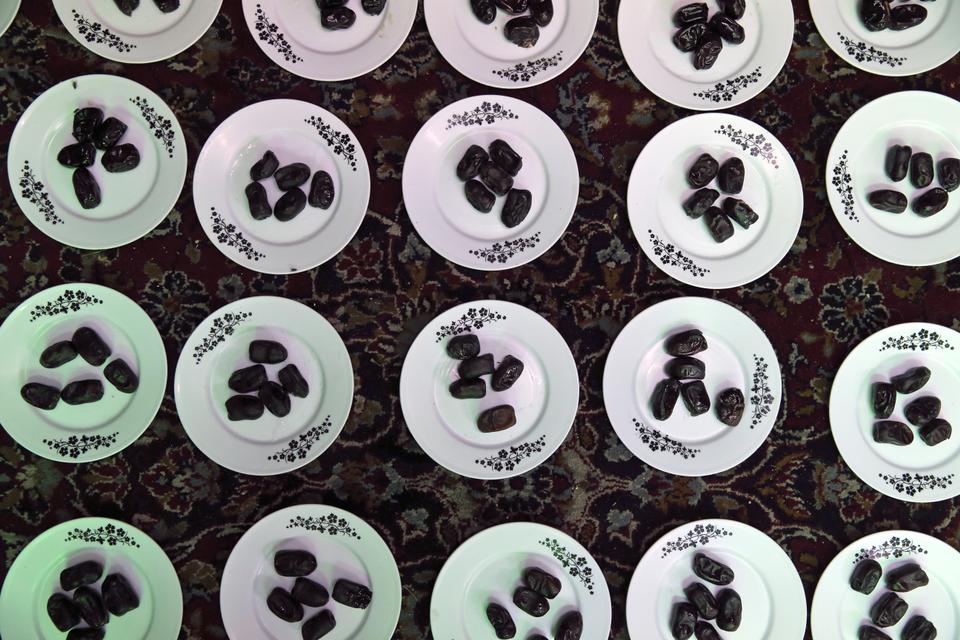
Plates of dates are prepared for “Iftar,” the sunset meal when Muslims break their fast during the holy month of Ramadan, in a street in Tehran, Iran. (Vahid Salemi / AP Archive)
”Our Prophet’s fast-breaking meal was extremely simple, far from luxury and waste,” says Celik. If they found one type of food, they would be happy to have it in their iftar, says Okur. During today’s iftars, there are various types of food from soup to rice and other dishes added such as fruits and desserts.
“Their iftars and suhurs were so simple. They were crushing a date mixing with either some flour or water to make their own food. Or they were mixing roasted flour with some olive oils to make another food,” he says.
But there were also people who did not even have such food in Medina back in 624. “As a result, Prophet Muhammad urged financially better conditioned Muslims to invite other Muslims with no food on their iftar table,” paving the way for developing the strong Muslim tradition of inviting friends, relatives and poor to share their food on common iftar tables.
Particularly people like Suffah, who were homeless and unmarried companions of the Prophet, migrated from Mecca to Medina and dedicated their lives to gaining religious knowledge from the Prophet, were too poor to afford such meals. “The Prophet incentivised other Muslims to host people of Suffah and not to leave them behind on their iftar tables,” Okur says.
The Prophet, who was more generous than other times in Ramadan, would also invite believers in need to her table at iftar as well as at suhur and offer them treats, says Celik.
“But at the end of the day, despite its simplicity, their iftars and suhurs were both healthier and more humble than ours today,” Okur concludes.

Murat Sofuoglu
___________________________________________________________________________________________________________________________________________
FOLLOW INDEPENDENT PRESS:
TWITTER (CLICK HERE)
https://twitter.com/IpIndependent
FACEBOOK (CLICK HERE)
https://web.facebook.com/ipindependent
Think your friends would be interested? Share this story!



